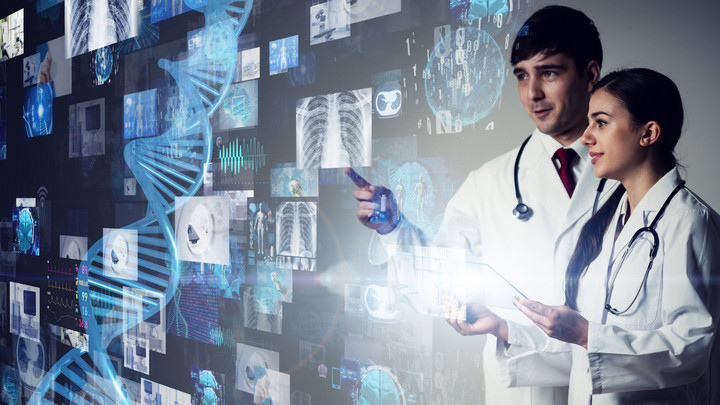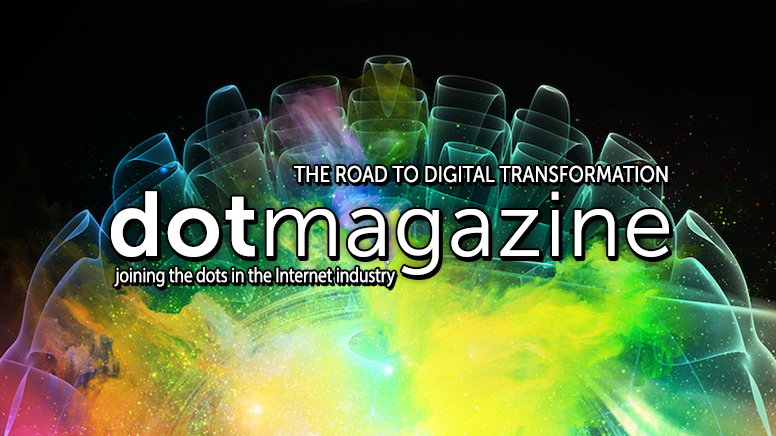Digital Transformation and AI: Balancing Today’s Business with the Business of Tomorrow
What does it take for a company to successfully manage digital transformation? Saskia Steinacker, Global Head of Digital Transformation at Bayer AG & member of the EC’s High-Level Expert Group on AI, explains.

© metamorworks | istockphoto.com
This article is derived from two interviews published on the German-language site of eco – Association of the Internet Industry on 22 August and 24 September 2019.
eco: How is digitalization impacting the Bayer Group – and could you perhaps offer us some specific examples from the field of healthcare?
Saskia Steinacker: Bayer offers a great opportunity to combine digitalization with the massive topics of nutrition and health. By 2050 there will be more than 10 billion people on earth who need medical care and sustenance. We want to make a contribution here with new solutions.
Looking specifically at the area of health: we are currently working on three areas in which digitalization can revolutionize the healthcare sector – early detection of diseases, precision medicine, and the significantly faster development of drugs. For better disease diagnosis, for example, we are developing software that can help identify patterns of the rare lung disease CTEPH. Precision medicine is about developing treatments that are personally tailored to the patient. For example, there are cancers based on a special gene mutation called NTRK gene fusion. There are special treatment methods for this, which is why it is so important to identify the specific cause of the disease. We are developing an algorithm for this purpose. And then there is the faster and more efficient development of drugs. Today, such development takes more than ten years and can cost a billion Euros, while less than one percent of developments are actually successful. Here, too, digitalization can help; for example, by conducting experiments digitally. Together with the Hungarian start-up Turbine, for example, we are developing a software solution that simulates how cancer cells behave and how they react to active substances.
eco: As Global Head of Digital Transformation, how do you transform a world market leader in Life Science like Bayer? And how do you manage to get everyone involved in the implementation process?
Steinacker: Certainly not alone. It takes two starting points, beginning with support from the top of the company. At Bayer I head up the Digital Transformation Board, on which four members of the Board of Management are represented, as are our Chief Information Officer and those responsible for IT and digital transformation in the various divisions. You also need the broadest possible base of digital enthusiasts who are willing to forge ahead and try out digital projects. On top of that, what is very important is that you closely link digital transformation with business. Digitalization is not an end in itself, but must support the company’s business. At Bayer, the aim is to help a rapidly growing and aging population to thrive and stay healthy, and to combat diseases such as cancer. Digital solutions can help us do that. You shouldn’t introduce technology simply because you somehow find it fancy and then do great pilots. That can just go belly-up.
In order to accelerate the digital transformation of companies, what is required is a transformation program, which for us takes the shape of the Digital Agenda. This ranges from learning new skills to better use of data, new platforms and digital solutions, through to partnerships with innovative start-ups. A very important focus of our Digital Agenda is cultural change, which includes more customer focus, more agile methods, collaboration, and experimentation. This requires the courage to try things out.
In my day-to-day work, I have to ensure that the potential of digitalization in the area of digital health or digital farming is fully recognized in our company and that the necessary conditions are created for its implementation. In concrete terms, this means, for example, that we have the necessary infrastructure and that we appoint employees with the appropriate know-how.
How can we step up digital transformation at Bayer? I talk to a lot of people about this every day and we strive to convert this into concrete projects. This takes persistence, because the pressure to act is not necessarily always appreciated in a business which has thus far been so successful. A lot of diplomacy is also necessary because I have to get a lot of different stakeholders on board.
eco: Every company must transform itself digitally. In your experience, what are the biggest obstacles in the process of digital transformation? And how can they be overcome?
Steinacker: The biggest danger is that digitalization will be dialed down as a priority. Real transformation doesn’t work that way. Companies need a good balance at management level between day-to-day business and the business of tomorrow. Because the potential of digital projects or new business models is naturally only realized as we move into the future. It is important that top management accords digitalization the status that it deserves – otherwise your business transformation will be imposed on you from external players: look at the affect Amazon has had on retail, or Airbnb on the hotel industry.
eco: In the course of Bayer’s digital transformation, which project impressed you most personally, and why?
STEINACKER: At Bayer, we have the Digital Innovation Awards, which bring digitalization projects and the teams behind them to the fore. Our colleagues’ enthusiasm for their projects is contagious. I’m thinking, for example, of a team in India that used drones for pollination for the first time in rice seed production. The people are passionate about the project, not only because they are providing Indian farmers with more income, but also because they know that they can make a contribution to the fight against hunger.
eco: Your career with the Bayer Group has covered a broad range of topics and roles. And to top it all, you are now also part of the European Commission’s High-Level Expert Group on Artificial Intelligence. How has all of this come about?
Steinacker: Digitalization is a cross-sectoral issue. Which is why having had very different positions in the Bayer Group offers distinct advantages. Basically, I have always been interested in developing better business solutions for customers – and that of course requires IT. It helped that I have a personal soft spot for topics such as programming and technology – I guess in that respect, I’m a bit of a geek. And now the technological transformation is impacting all areas of life, and that goes hand in hand with greater responsibility. We need the debate on digitalization to take place in society as a whole, and both Bayer – and I myself – want to play our part in that. That’s why I took the opportunity to be part of the EU’s Expert Group on Artificial Intelligence.
eco: From your perspective as a member of the Expert Group on Artificial Intelligence: why do we need ethical guidelines for the use of artificial intelligence? And what do you think they should look like?
Steinacker: Artificial intelligence is a technology that can be used in both positive and negative ways. Reservations and fears abound, and with good reason. The loss of people’s autonomy in favor of machines, the restriction of data protection, the impact on the labor market: all of these are real dangers. We therefore need guidelines in order to take this fear on board and to dispel it, and to gain society’s acceptance of digital technologies such as artificial intelligence. That is why I am involved in the Expert Group. On the other hand, however, we must be careful not to shape the framework conditions in the EU in such a manner that technological progress takes place outside of Europe. The right balance is important.
I am convinced that Europe can be a pioneer in developing an ethical framework for the use of artificial intelligence. Incidentally, the issue is now also being discussed in the USA and Asia. In Europe, we have now reached the point where we can put the guidelines to the test under real conditions, with companies being able to test what it means for AI applications to be trustworthy. To this end, we have created an assessment list, with the test phase running until the end of the year. Bayer is, of course, also involved.
Saskia Steinacker was named Head of Digital Transformation at Bayer AG in February 2017. Steinacker originally joined Bayer in 2004, and held a succession of roles in marketing and IT.
As well as being a member of the European Commission’s High-Level Expert Group on Artificial Intelligence, Steinacker is also a member of the Presidency Committee of eco – Association of the Internet Industry.
In her free time, Saskia is an avid supporter of New Media Art and serves as a mentor in programs for underprivileged women. She graduated from Ecosign Academy with a degree in Communication Design and holds a Masters in Business Administration from Liverpool University.
Please note: The opinions expressed in Industry Insights published by dotmagazine are the author’s own and do not reflect the view of the publisher, eco – Association of the Internet Industry.




